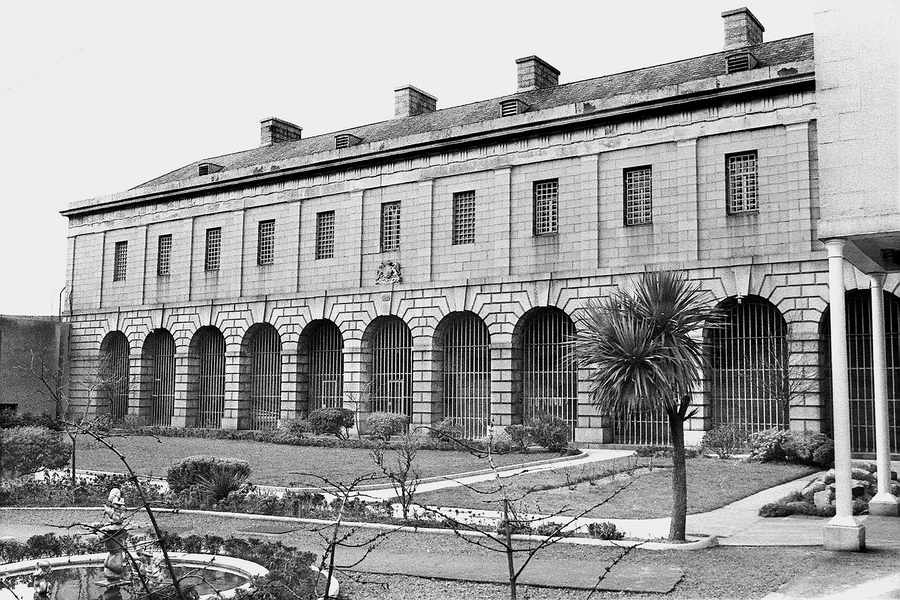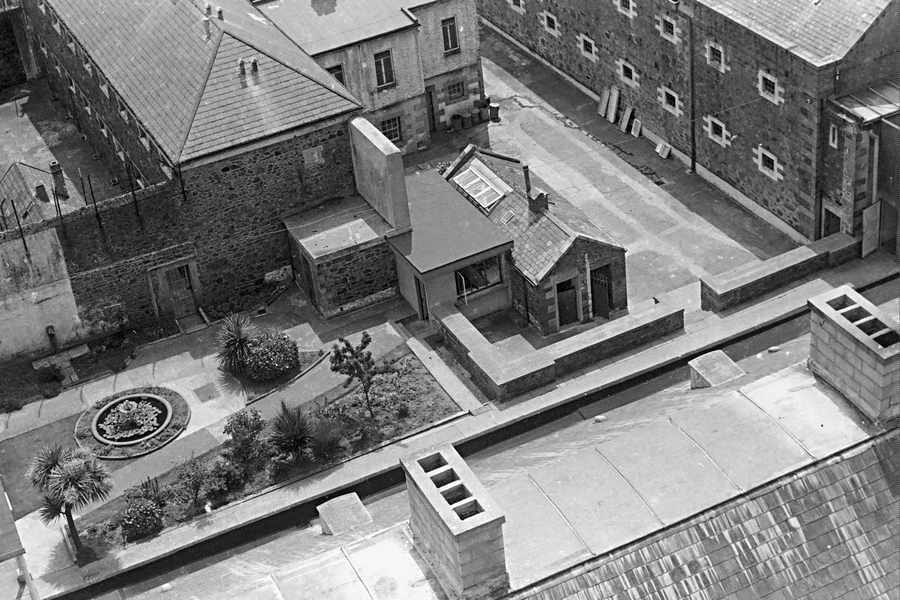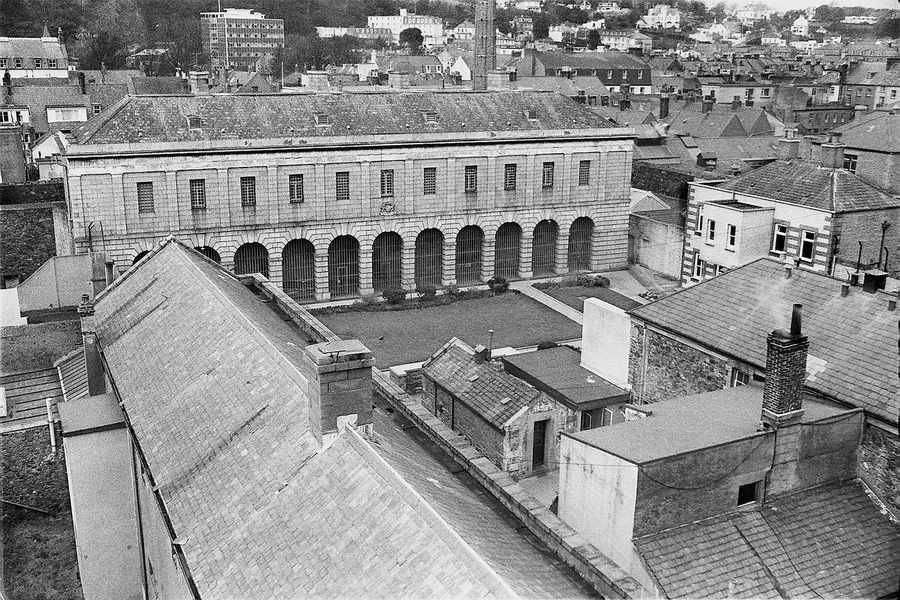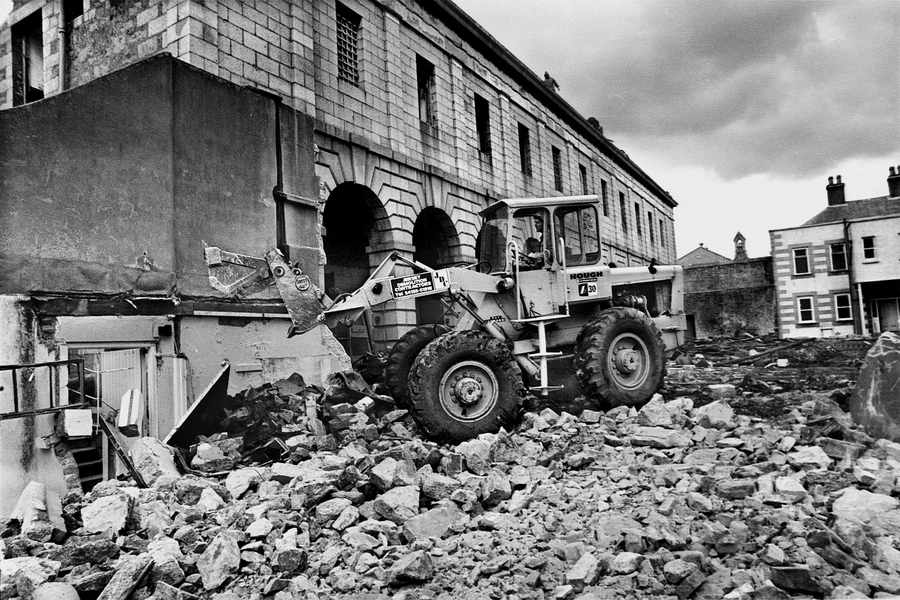AS David Burt turns through pages of yellow-tinged newspaper clippings, he uncovers lost fragments of the Island’s 20th-century history. Among his collection are photographs of Newgate Prison – Jersey’s former lock-up constructed at the beginning of the 18th century, used until 1975. Located in the heart of St Helier, in the area that is now the General Hospital, the building’s granite facade, complete with exquisite arches, had a grand, semi-palatial feel.
What is wasn’t, however, was secure. As the grandfather-of-four continues to turn the pages and delve deeper into his memory banks, we discover stories of elaborate escapes that any Hollywood script writer would be proud of.
‘That building was a bit tired to say the least,’ the ex-assistant chief prison officer says as we chat at Overdale Hospital, where is he recovering from major spinal surgery.
‘One time one of the prisoners dug a hole in the wall and I found it at one o’clock in the morning when I was making my rounds.
‘He had managed to dig his way through the wall with a piece of metal – it was a pretty thick wall so it must have taken some time. There was a blanket and a pillow arranged as though his head was resting on it, but when I pulled back the blanket, it was full of stones. It was like something out of the films!

‘If I’d have got there ten minutes earlier I’d have got him because he got stuck half way through. A lot of his skin had been scraped off his sides, but he managed to make it and drop down into the yard.
‘I had to ring and tell the governor what had happened, and he wasn’t very happy to say the least. Thankfully I was cleared because I had done my job finding the hole.’
As we flick through the pages in the scrapbook, Mr Burt recalls another time when an inmate successfully fled via the prison’s ceiling. Moments later he remembers a separate occasion when two female prisoners took advantage of their move to Government House.
He said: ‘We had one that went through a ceiling. She climbed up onto one of the top bunk beds, cut a hole in the ceiling and went out.
‘I remember some of the women were moved just around the corner to Government House, because of the overcrowding at the prison. When the matron came in one night, one of the women pushed her into the toilet and locked the door. Two of them went downstairs, jumped through a window, climbed up on a shed and dropped over the back wall.’

Although the stories now seem amusing, Mr Burt says there were stricter measures in place for prisoners convicted of more serious crimes.
‘We had Francis Huchet who had shot his mate that he had been drinking with in the Horse and Hound. It was pretty horrific. I remember that it was some time after that walkers found a foot sticking out in the sand dunes – he had buried him on that spot.
‘As soon as people who are convicted of murder came into the prison, we had to have two officers watching over them because for safety reasons it was dangerous to have just one person, as the prisoners had nothing to lose,’ he said.
Huchet would become the last ever person to be hanged in Jersey – and it would be one of Mr Burt’s duties to stay with him on the final night before his execution.
‘We were playing cards with him until about 3 am. He was quite calm – if it was me I think I’d have been bottling it. I think we asked him if he wanted to play any more, but he’d had enough and he soon went off to sleep. I think it was about six o’clock that I gave him a shout and I gave him a cup of coffee. We took him down the stairs and the next minute the prison chaplin came in, so we had to leave.
‘We waited about half an hour and then six of us were called back to go and get him as he was already in the coffin.
‘I recall there was a crowd outside the prison gates and they had a famous executioner from the UK. Above all I remember it being quite emotional.
‘Like all the murderers, after a couple of weeks you get to know them well because we’d come in and play cards and they become like a mate really. I did get to know Huchet quite well and I felt sorry for his wife and his kiddies, but then when you think of what he did – it’s a very tough situation.’

Another of the more notorious inmates that Mr Burt looked after was Edward Paisnel – the man nicknamed the Beast of Jersey who sexually abused women and children over an 11 year period in the 1960s and 70s.
‘Paisnel was more or less kept on his own,’ he said. ‘We used to exercise him on his own and he didn’t really say much to anybody. We only had him for two years before he got shipped to the Isle of Wight.’
After the transfer from Newgate Street to La Moye in 1975, Mr Burt set up the young offenders wing and became the assistant chief prison officer – a role he maintained for the next ten years before his retirement.
In recognition of the time that he worked in the two Island prisons, Mr Burt was presented the Imperial Service Medal by the Bailiff on behalf of the Queen.
His retirement has given him more time to spend with his wife Kathleen – the couple having celebrated their 50th wedding anniversary two years ago.
Looking back, he says the aspect that he most treasures from his time in the prison service is the bond he created with his colleagues.
‘I couldn’t have worked with a better crowd of lads,’ he said. ‘We had such camaraderie and I knew that if there were any difficult situations, they had my back and I had theirs. That’s why when I left I didn’t want to lose touch with anyone and I set up the club, which is amazingly now 25 years old.’
As he comes to the end of his scrapbook, there is one last photo of Mr Burt – he is covered in foam and is being lifted out of La Moye on a stretcher to mark his last day at the prison. With colleagues like that, it’s no wonder why he feels so lucky and the group remain so close.







